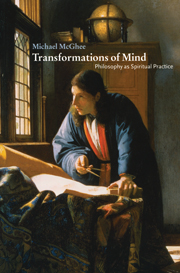Book contents
- Frontmatter
- Contents
- Acknowledgements
- Introduction
- 1 ‘A philosophy that is not a philosophy’
- 2 Contrary states
- 3 ‘… you hear the grating roar’
- 4 The energy for war
- 5 The division of the soul
- 6 ‘Wandering between two worlds …’
- 7 Kant's aesthetic ideas
- 8 … And his rational ones
- 9 Arnold's recast religion
- 10 Theism, non-theism and Haldane's Fork
- 11 Erotic reformations
- 12 A language of grasping and non-grasping
- 13 ‘… sinne/ like clouds ecclips'd my mind’
- 14 Concentration, continence and arousal
- 15 Uneasily, he retraces his steps …
- References
- Index
10 - Theism, non-theism and Haldane's Fork
Published online by Cambridge University Press: 07 December 2009
- Frontmatter
- Contents
- Acknowledgements
- Introduction
- 1 ‘A philosophy that is not a philosophy’
- 2 Contrary states
- 3 ‘… you hear the grating roar’
- 4 The energy for war
- 5 The division of the soul
- 6 ‘Wandering between two worlds …’
- 7 Kant's aesthetic ideas
- 8 … And his rational ones
- 9 Arnold's recast religion
- 10 Theism, non-theism and Haldane's Fork
- 11 Erotic reformations
- 12 A language of grasping and non-grasping
- 13 ‘… sinne/ like clouds ecclips'd my mind’
- 14 Concentration, continence and arousal
- 15 Uneasily, he retraces his steps …
- References
- Index
Summary
But this reductive spiritual realism I am trying to articulate is only one response to positivism and the Death of God. It is a response from someone who sees no way back, and is trying to make sense of intimated possibilities that announce themselves to a more or less alert consciousness that has to learn how to attend. But someone of the same attentiveness may want to interrogate the Death of God itself, and return us to a classical theism which it is felt that Nietzsche and other secularisers have wholly failed to understand, a return to the notion of God as that ‘great ocean of being’ who is ‘beyond the order of all beings’ and their uncaused cause. And someone who took that direction may well have taken a hint precisely from Heidegger's idea of a ‘calm, self-possessed surrender to that which is worthy of questioning’.
The classical form of critical theological realism envisages an uncaused cause of all there is and claims that we can know by the light of reason that it exists, but that we cannot either comprehend or adequately represent it. Given that we are able thus to establish that there is an uncaused cause of all there is whose provident nature is revealed independently in scripture, we can know something of its operations by reference to its effects. It is this God that is, according to Nietzsche, ‘dead’. Such claims, of course, have always been in contention, and that no doubt was the source of Matthew Arnold's conclusion that they cannot be verified.
- Type
- Chapter
- Information
- Transformations of MindPhilosophy as Spiritual Practice, pp. 149 - 170Publisher: Cambridge University PressPrint publication year: 2000



